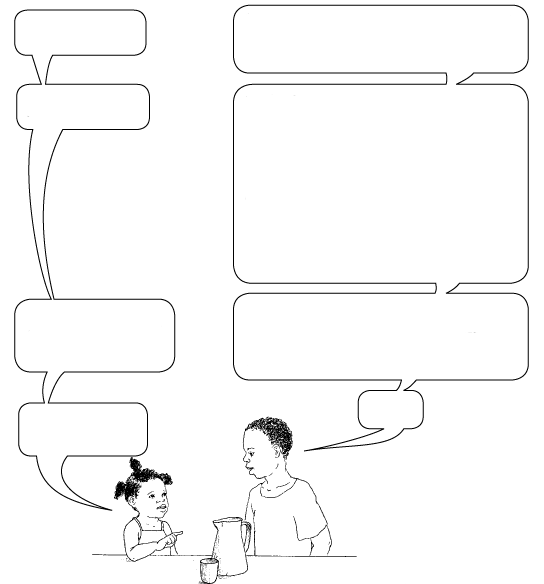Hesperian Health Guides
Telling a child he has HIV
HealthWiki > Helping Children Live with HIV > Chapter 5: Talking with children about HIV > Telling a child he has HIV
Contents
Fears about disclosure

Most parents and caregivers fear telling a child he has HIV. They worry about how the child will feel. They worry about difficult questions the child may ask. They fear the child will tell others. Disclosing HIV can bring up feelings of guilt and shame if a parent blames herself for the fact that she and her child have HIV.
Parents may already worry for their child’s future: Will he be teased or rejected in school? Will he be ill or weak? Will he die while still young? Parents and caregivers may also fear thinking about their own illness and death. All these reasons can delay people telling a child he has HIV.
Telling a child someone in his family has HIV can also be difficult. Some parents and caregivers worry that their child will become depressed and worry too much. Some fear they will be rejected by their children.
What helps parents disclose
 I think he knows anyway. I will tell him so he can talk to me about it. |
 We will be closer. |
 I can reassure her that HIV is not the end of life, but simply a challenge. And we will face it together. |
 If they find out by accident it would be worse. |

When they first learn they have HIV, children may have some of the feelings you fear. But most children are able to accept this news, especially if you are willing to accept their feelings, can be calm and strong yourself, and answer their questions patiently and honestly. Most parents feel a huge sense of relief once they have disclosed their HIV to their child.
Only you can decide when you and your child are ready to talk about HIV. Some children are very mature and curious and will seem ready to discuss HIV at a young age. For other children, you may feel that you should wait until they are older. But keep in mind that, usually, children are ready to learn about their HIV sooner than you think.
Many children who learn they have HIV when they are older wish they had been told earlier.

How to tell a child she has HIV

When preparing to tell a child about his HIV, here are some things to do or think about:
- How will you answer questions the child may ask? Think about the difficult questions, and what you can say. Consider how much your child can understand, and how you can be both honest and comfortable with your answers.
- Thinking through your own feelings about HIV and illness in your family will help you accept your child’s feelings. It is common for a caregiver to feel guilt, fear for a child’s future, and sadness or anger. First talk to others you trust to get your own support.

- Practice what you will say with someone.

|
 Now that we are going home, let us talk. I have something to tell you. |
 Papa, I don’t understand. How did something get into my blood? What about my brother? Does he have it too? |
|
- Respond to their reaction, no matter what it is, with as much patience, honesty, love, and acceptance as possible.

Sometimes a child will be silent, sometimes he will be angry, or sometimes he will have lots of questions. Very often a child will act as though nothing has happened, but later his mood will change to sadness or fear. Remember that talking about HIV will continue over many years and your child may react differently each time HIV is discussed.
- Stay hopeful when you talk about HIV

Talking about stigma and privacy
Even though you may have taught your child to tell the truth and not keep things from you, you will also need to teach your child that HIV is something she can only talk about with certain people. Talk to your child about how sometimes HIV is a private matter. Explain that HIV is not something to talk to all her friends about. As your child gets older, you can help her decide when a friend or teacher at school might be a trusted person that she can disclose to.
It helps children to have more than one adult to talk with about their HIV. This could be a family member, a friend, a counselor, or a trusted neighbor.
Sometimes children can talk more freely at an HIV support group.

Many people do not understand HIV. They are afraid of it. Sometimes people treat a person very badly if they think she has HIV. That is why we only talk about the HIV in our family with Uncle Abraham or Mrs. Bukenya.
Have you ever seen anyone treated badly because of illness? Or heard people say mean things about AIDS?
Ongoing support for children
A child of any age may already know she is sick or that there is a problem in her blood, and still react strongly when she learns it is HIV. After finding out she is HIV positive, a child will usually go through stages, from shock and fear to sadness and acceptance. These reactions are similar to those of an adult but can be stronger and less predictable in children. You may need to repeat information and answers to questions, especially for a younger child. Remind children they are not alone, and find other supportive adults for them to talk to.
Most children learn to cope with the worry and pain that come with HIV infection and any problems from the medicines that treat HIV.
Find other children with HIV or who live in families with HIV for you and your children to talk to and play with. There may be children’s programs or support groups at HIV clinics. If your clinic does not have one, start your own. See HIV support groups for more on starting support groups, and Role Models and Junior Farmer Field and Life Schools for more examples of children providing support for each other.



